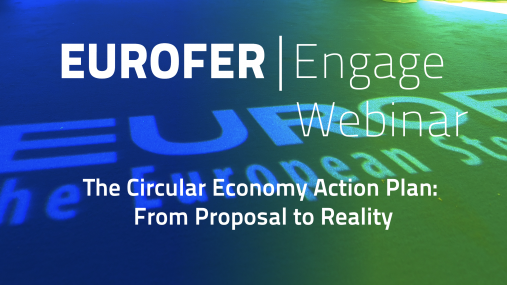
Downloads and links
Download files or visit links related to this content
About steel » Events » EUROFER Engage | Webinar - Making sense of EU climate policy
EUROFER Engage | Webinar - Making sense of EU climate policy
Countdown
Frequently Asked Questions
Downloads and links
EUROFER's Engage | Webinar - Making sense of EU climate policy took place on 17 March from 14:30 till 15:45.
Making sense of EU climate policy
In 2021, the EU is not only working out how to put an effective Carbon Border Adjustment Mechanism (CBAM) into place, but is also looking at how to reshape the EU Emissions Trading System in line with the EU Climate Law and its 55% 2030 target, promulgated in 2020.
The European steel industry is committed to contributing to EU’s climate and energy goals and European companies have been launching several projects to reduce emissions deeply. Yet, the successful implementation of such projects requires a comprehensive and supportive regulatory framework, including funding support, access to low carbon energy sources at internationally competitive prices and de-risking instruments such as contracts for difference.
Higher climate ambition requires strengthened carbon leakage measures, in particular for sectors at highest risk, such as steel – not their weakening. A CBAM might provide this strengthened carbon leakage protection, but only if it complements free allocation at the level of the current benchmarks and addresses the shortcomings of the existing measures for a transition period. This transition period should run until a market for ‘green’ steel is fully formed.
This webinar will discuss the implications of the EU’s latest moves on the steel industry, as well as how the CBAM should be implemented and its effects on the rest of EU climate legislation.
EUROFER’s views on how steel can support the EU’s climate objectives will also be presented – showing that the steel is well placed to help meet the EU’s climate objectives in the right circumstances.
When & where?
The webinar took place on Wednesday, 17 March 2021 from 14:30-15:45 online, via Zoom.
Who is invited?
The seminar is open to anyone interested in finding out about the impact of EU climate policy on the EU steel industry.
Schedule
Times are indicative only
14:30 | Presentation
EU climate policy, and the example of steel
14:45 | Panel discussion and Q&A
Moderation by Jacki Davis
Making sense of EU climate policy in 2021 and beyond
15:45 | End of discussion
Thursday, 28 October 2021, starting at 11:00
The webinar will take place online via Zoom. The link will be sent to registered participants in the days before the event takes place.
The webinar is open to anyone interested in the state of the steel market.
This event is free to attend for all participants.
A sector striving to reduce its impact on the climate
Climate protection is the focus of much of the European steel industry’s research, development and deployment activity. Continuing the downward trend in energy use and climate-impacting greenhouse gas emissions is essential to ensuring the sustainability of the European steel sector.
The European steel industry is the most advanced of its kind in the world. As it is, Europe leads the way in environmental and climate performance. CO2 emissions and energy use in European steel production have been halved since 1960.
This transition will require significant investment in new technological development and deployment, in energy infrastructure, consumption and type, and will require access to high-quality materials, such as iron ore and scrap. EUROFER works on climate and energy issues to establish how this essential change can happen in the sector, ensuring that Europe remains on track to fulfil its Paris Climate Accords requirements, whilst also making European steel fit for a clean, low-carbon future.
With advanced technologies, and under the right circumstances, the EU steel industry could achieve a revolutionary transformation in the way it makes steel and in its environmental impact. The whole European steel industry is being driven to reduce its direct and indirect CO2 emissions – and could achieve CO2 emissions cuts of 80-95% in 2050 compared to 1990 levels.
However, this change is not an instantaneous shift: it is an iterative process that will require adjustments and a managed transition between phases. Moreover, the investment and research needed to make the transition are enormous, and so EU climate policy will increasingly impact trade because of the need to prevent carbon leakage and ensure a market for green steel in Europe.
The overall transformation would be enabled by hydrogen-based steelmaking, by adapting fossil fuel-based steelmaking through process integration, through the use of renewable electricity in production, and through the capture and use of waste carbon for the production of chemicals and increased recycling of steel scrap and steel by-products.